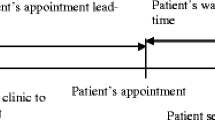Abstract
This paper tackles the problem of allocating medical students to clinical specialities over a number of time periods. Each speciality is offered by a number of consultant led ‘firms’ and the objective is to optimise the schedule in terms of ensuring a broad range of experience for each student, whilst ensuring that every student covers every speciality exactly once without exceeding the number of places available in each firm. The balance between feasibility and optimality is a key issue. We develop a family of GRASP heuristics for the problem, all based on the same local search heuristic, but using a variety of constructions. These use different building blocks, different score functions, and different ways of balancing feasibility and optimality. Empirical tests show that the best heuristic, based on large building blocks facilitated by the use of a network flow model, and enhanced by feedback in the form of partial reconstructions, performs extremely well on real data, and is able to produce acceptable solutions on more challenging artificial problem instances.

Similar content being viewed by others
Notes
Where there is a tie for the last place(s) in the list the choice(s) among the tying options is made with equal probability.
References
Aiex, R. M., Binato, S., & Resende, M. G. C. (2003). Parallel GRASP with path-relinking for job shop scheduling. Parallel Computing, 29, 393–430.
Blum, C., & Roli, R. (2003). Metaheuristics in combinatorial optimization: overview and conceptual comparison. ACM Computing Surveys, 35(3), 268–308.
Casey, S., & Thompson, J. (2003). GRASPing the examination scheduling problem. In E. Burke & P. De Causmaecker (Eds.), Lecture notes in computer science: Vol. 2740. PATAT 2002 (pp. 232–244).
Drexl, A., & Salewski, F. (1997). Distribution requirements and compactness constraints in school timetabling. European Journal of Operational Research, 102, 193–214.
Feo, T. A., & Resende, M. G. C. (1995). Greedy randomized adaptive search procedures. Journal of Global Optimization, 6, 109–133.
Feo, T. A., Resende, M. G. C., & Smith, S. H. (1994). A greedy randomised adaptive search procedure for maximum independent set. Operational Research, 42, 860–878.
Festa, P., & Resende, M. G. C. (2004). An annotated bibliography of GRASP: AT&T Labs (Research technical report TD-5WYSEW).
Fleurent, C., & Glover, F. (1999). Improved constructive multistart strategies for the quadratic assignment problem using adaptive memory. INFORMS Journal on Computing, 11, 198–204.
Goodman, M. (2007). Construction–based metaheuristics for personnel scheduling problems. Ph.D. Thesis, Cardiff University.
Goodman, M., Dowsland, K. A., & Thompson, J. M. (2009). A grasp-knapsack hybrid for a nurse-scheduling problem. Journal of Heuristics, 15(4), 351–379.
Laguna, M., & Martí, R. (2001). A GRASP for coloring sparse graphs. Computational Optimization and Applications, 19, 165–178.
Pitsoulis, L., & Resende, M. G. C. (2001). Greedy randomized adaptive search procedures. In M. P. Pardalos & M. G. C. Resende (Eds.), Handbook of applied optimization (pp. 168–181).
Rojanasoonthon, S., & Bard, J. (2005). A GRASP for parallel machine scheduling with time windows. INFORMS Journal on Computing, 17(1), 32–51.
Resende, M. G. C. (2001). Greedy randomized adaptive search procedures (GRASP) (Vol. 2, pp. 373–382). Dordrecht: Kluwer Academic.
Resende, M. G. C., & Festa, P. (2003). An updated bibliography of GRASP: AT&T Labs Research Technical Report TD-5SB7BK.
Resende, M. G. C., & Ribeiro, C. C. (2002). Greedy randomized adaptive search procedures. In F. Glover & G. A. Kochenberger (Eds.), Handbook of metaheuristics (pp. 219–249). Dordrecht: Kluwer Academic.
Robertson, A. J. (2001). A set of greedy randomized adaptive local search procedure (GRASP) implementations for the multidimensional assignment problem. Computational Optimization and Applications, 19(2), 145–164.
Author information
Authors and Affiliations
Corresponding author
Rights and permissions
About this article
Cite this article
Goodman, M.D., Dowsland, K.A. & Thompson, J.M. Hybridising GRASP and network flows in the solution of a medical school scheduling problem. J Sched 15, 717–731 (2012). https://doi.org/10.1007/s10951-012-0289-6
Published:
Issue Date:
DOI: https://doi.org/10.1007/s10951-012-0289-6




